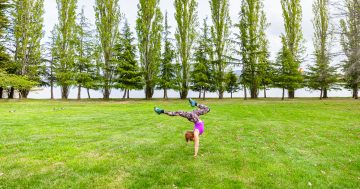
The first tip to a successful New Year’s resolution – pick one. Photo: Envato.
If you start each new year with vows to quit smoking and social media, become a vegan and run a marathon, only to have it all come crashing down by March, you’re not alone.
Resolutions are notoriously fickle. The cynics among us eschew them altogether, but it doesn’t have to be that way.
Behavioural scientist at the CSIRO and Doctor of Psychology Naomi Kakoschke said the spike in motivation around the new year could be a powerful motivational tool.
The devil is in the details.
She said we needed to start where most of us ended – with good intentions.
“When we think about change we usually set an intention, something we would like to achieve or the sort of person we would like to become,” she said.
“An intention isn’t a goal, it’s too general, but we can use it to identify a specific goal.”
A common pitfall is trying to change too much at once. Dr Kakoschke said it was more effective (and less overwhelming) to identify one goal we cared about most.
If your intention is to become healthier, a more specific goal could be to get fitter.
“You need to make a plan to achieve that goal,” Dr Kakoschke said.
“What type of physical activity will you do? How intense will it be? How often will you do it? Who will you do it with?
“If your plan is to run for five minutes once every three weeks, that’s probably not going to be very effective. If you don’t currently do any exercise and you plan to run a marathon, that might be too ambitious.”
Planning identifies what you can realistically do to move you towards your goal.
For our imaginary fitness goal, that could look like going from nothing to doing an exercise class with a friend once a week and taking a jog around the block with the dog on the weekend.
Even the best-made plans can fall apart when they meet the cold, hard light of reality, however.
Never fear, there are solutions.
Remembering why you set the goal in the first place can help.
“Picture the future you,” Dr Kakoschke said.
“Often the reason we struggle is thinking about what’s good for our current self.
“Right now eating a chocolate bar and sitting on the couch watching your favourite TV show will best serve your current self.
“Eating a salad and going for a walk might not be as comfortable, but if we think about the future where we are fit enough to run around with our kids, we’re more likely to do something in the current moment that will get us to that future.”
Connecting our new behaviours with habits we have already can also help – like riding a stationary bike while we watch that favourite TV show, or doing squats every time we clean our teeth.
Different motivators will work for different people. If exercise is your quiet time, setting an alarm with your favourite running playlist could be a helpful reminder.
If you’re a social butterfly, scheduling a run with a friend can help keep you accountable.
A support network can help keep your motivation high. If the people in your life don’t share your goals it could be worth talking to a professional, or looking for an online community.
Next, we need to plan to fail.
Life will throw curveballs our way, so we should find strategies to address them before they hit us.
Take your gym gear to work so you can squeeze in an exercise class if you’re running late, or stash some herbal tea where you used to keep the wine bottles.
Practising positive self-talk for when we stumble can help stop a slight detour from derailing our progress.
Setting other times throughout the year to reflect on our goals can help keep us on track.
“Changes in seasons can be a good time to check in,” Dr Kakoschke said.
“We can think about what we’ve learnt, and take a look at whether our goals are still attainable and still important to us.
“Health might still be a value, but maybe what that looks like in your day-to-day has changed.
“That’s OK – there’s no point sticking at something that isn’t important to you anymore.”
Original Article published by Zoe Cartwright on Region Illawarra.





















